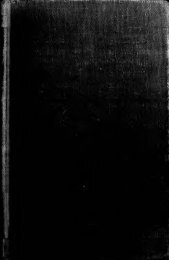Ecclesiastes - GA Barton - 1908.pdf
Ecclesiastes - GA Barton - 1908.pdf
Ecclesiastes - GA Barton - 1908.pdf
Create successful ePaper yourself
Turn your PDF publications into a flip-book with our unique Google optimized e-Paper software.
PUNY MAN A<strong>GA</strong>INST FATE [Cn. 6 10-"<br />
Essenes, as to how far fate controls the actions of men,<br />
137<br />
the Phari-<br />
sees contending that it controls some of their actions, the Sadducees<br />
that it controls none of them, and the Essenes that it controls all<br />
(see Jos. Ant. xiii, 5"; xviii, i 3 4 and BJ. ii, 8 14<br />
).<br />
To what ex-<br />
tent these disputes were carried on as early as the time of Qoheleth,<br />
however, we do not know. We cannot clearly trace the sects<br />
mentioned in his time. Qoheleth maintains that man is so power-<br />
less against his Creator that discussion of the matter is futile.<br />
What advantage has man], in his powerless position. 12.<br />
Who knows what is good for man]. The positive question is a<br />
negative assertion. No one knows what is really good, for power,<br />
possessions, sensual enjoyment, and wisdom have been shown to<br />
be vanity. The number of the days of his vain life]. This reminds<br />
the reader of the verdict on life which Qoheleth has repeatedly<br />
reached. Like a shadow]. The thought that human life is as<br />
unsubstantial as a shadow finds expression several times in the<br />
cites an<br />
OT., as i Ch. 2Q 15<br />
Job 8 9 Ps. io2 n and I44 4 . PL<br />
expression of the same sentiment from Sophocles:<br />
In this I see that we, all we that live,<br />
Are but vain shadows, unsubstantial dreams.<br />
(Ajax, 127 /.}<br />
The thought expressed by Qoheleth is rather that human life flits<br />
Job 14* Ps.<br />
shall be after him]. The uncertainty of the future<br />
like a shadow. It is more nearly akin to ch. 8 13<br />
log 23 . What<br />
creates a part of the difficulty of telling what is good for man.<br />
6 10 . *VJ>N], i.e., what sort of creature man is, cf. Ex. i4 13 . Perhaps, as<br />
Ty. thought, the words were 3<br />
shaped by a reminiscence of Gn. 6 , NVi OJBO<br />
-ifca. Dy jnS], used in the sense of an, occurs only here EDB.<br />
(cf.<br />
I92b), though fi"U="be at strife," occurs in 2 S. 19' . The nearest<br />
parallel is in Gn. 6 3 , though there probably the original reading<br />
did not<br />
contain fi'T (cf. BDS. i92b). Ty. thought this text an allusion to<br />
Gn. If that had been corrupted into its present form by the time Q.<br />
wrote, perhaps Ty. was right. *^pnnip], Qr. *i>pna> is probably, as<br />
Dr. conjectures (in Kit.'s BH.), a corruption of rppn Nine*, cf. hny mr\&<br />
ch. 2M . Some have taken the Kt. as a Hiph., but that is not so probable,<br />
as elsewhere its Hiph. does not occur in Heb. *VP, n] is an Aramaism,<br />
cf. Dn. 2 40 - 42 3 33 and the cognate Syr. 11. onai] was taken by Kn.<br />
and Gins, as "things," as (I takes it, but d, &, U and A, which render it





